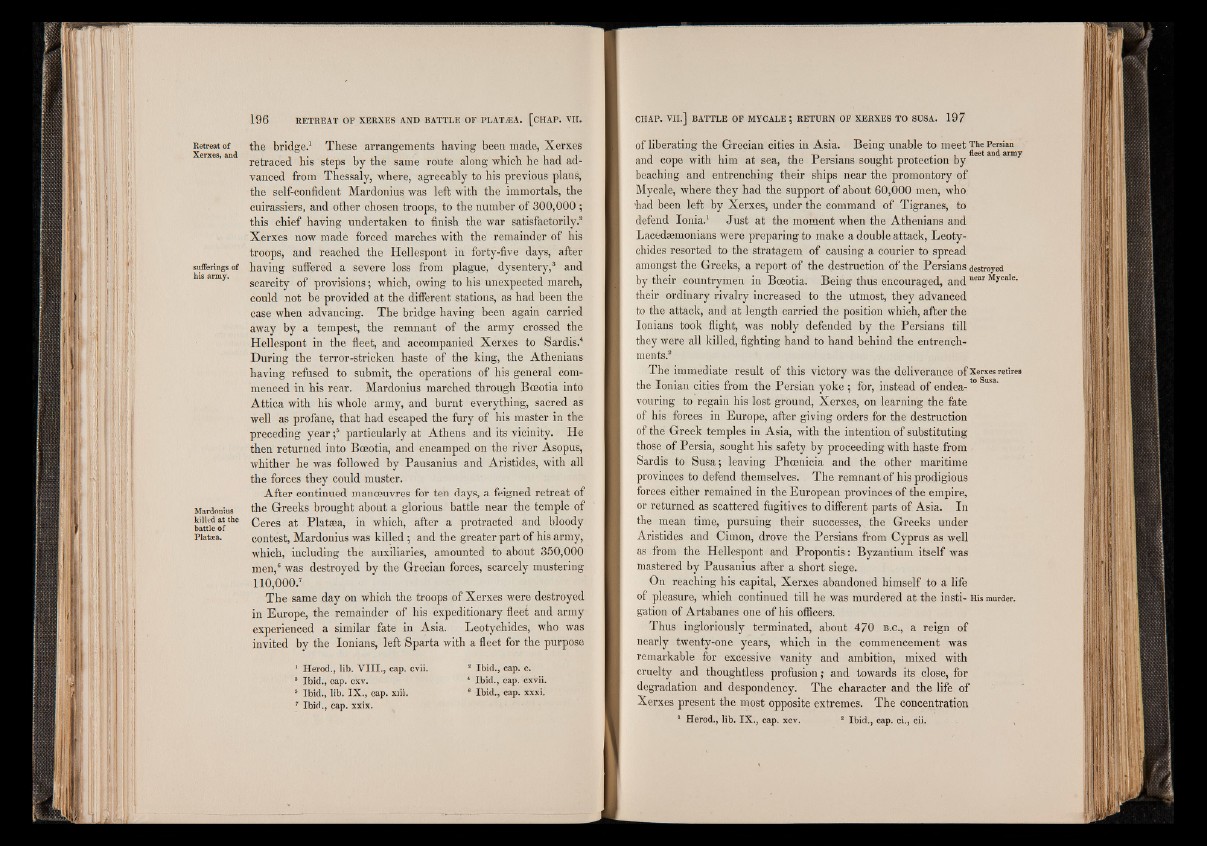
Retreat of
Xerxes, and
sufferings of
his army.
Mardonius
killed at the
battle of
Platæa.
the bridge.' These arrangements having been made, Xerxes
retraced his steps by the same route along which he had advanced
from Thessaly, where, agreeably to his previous plans,
the self-confident Mardonius was left with the immortals, the
cuirassiers, and other chosen troops, to the number of 300,000 ;
this chief having undertaken to finish the war satisfactorily.2
Xerxes now made forced marches with the remainder of his
troops, and reached the Hellespont in forty-five days, after
having suffered a severe loss from plague, dysentery,3 and
scarcity of provisions ; which, owing to his unexpected march,
could not be provided at the different stations, as had been the
case when advancing. The bridge having been again carried
away by a tempest, the remnant of the army crossed the
Hellespont in the fleet, and accompanied Xerxes to Sardis.4
During the terror-stricken haste of the king, the Athenians
having refused to submit, the operations of his general commenced
in his rear. Mardonius marched through Bceotia into
Attica with his whole army, and burnt everything, sacred as
well as profane, that had escaped the fury of his master in the
preceding year ;6 particularly at Athens and its vicinity. He
then returned into Bceotia, and encamped on the river Asopus,
whither he was followed by Pausanius and Aristides, with all
the forces they could muster.
After continued manoeuvres for ten days, a feigned retreat of
the Greeks brought about a glorious battle near the temple of
Ceres at Platæa, in which, after a protracted and bloody
contest, Mardonius was killed ; and the greater part of his army,
which, including the auxiliaries, amounted to about 350,000
men,6 was destroyed by the Grecian forces, scarcely mustering
110,000.’
The same day on which the troops of Xerxes were destroyed
in Europe, the remainder of his expeditionary fleet and army
experienced a similar fate in Asia. Leotychides, who was
invited by the Ionians, left Sparta with a fleet for the purpose
1 Herod., lib. V I I I ., cap. cvii.
s Ibid., cap. cxv.
5 Ibid., lib. IX ., cap. xiii.
7 Ibid., cap. xxix.
Ibid., cap. c.
Ibid., cap. cxvii.
Ibid., cap. xxxi.
of liberating the Grecian cities in Asia. Being unable to meet The Persian
and cope with him at sea, the Persians sought protection by 66 41111
beaching and entrenching their ships near the promontory of
Mycale, where they had the support of about 60,000 men, who
■had been left by Xerxes, under the command of Tigranes, to
defend Ionia.1 Just at the moment when the Athenians and
Lacedaemonians were preparing to make a double attack, Leotychides
resorted to the stratagem of causing a courier to spread
amongst the Greeks, a report of the destruction of the Persians destroyed
by their countrymen in Bceotia. Being thus encouraged, and near Mycale-
their ordinary rivalry increased to the utmost, they advanced
to the attack, and at length carried the position which, after the
Ionians took flight, was nobly defended by the Persians till
they were all killed, fighting hand to hand behind the entrenchments.
2
The immediate result of this victory was the deliverance of Xerxes retire«
the Ionian cities from the Persian yoke ; for, instead of endea-t0 usa"
vouring to regain his lost ground, Xerxes, on learning the fate
of his forces in Europe, after giving orders for the destruction
of the Greek temples in Asia, with the intention of substituting
those of Persia, sought his safety by proceeding with haste from
Sardis to Susa; leaving Phoenicia and the other maritime
provinces to defend themselves. The remnant of his prodigious
forces either remained in the European provinces of the empire,
or returned as scattered fugitives to different parts of Asia. In
the mean time, pursuing their successes, , the Greeks under
Aristides and Cimon, drove the Persians from Cyprus as well
as from the Hellespont and Propontis: Byzantium itself was
mastered by Pausanius after a short siege.
On reaching his capital, Xerxes abandoned himself to a life
of pleasure, which continued till he was murdered at the insti- His murder,
gation of Artabanes one of his officers.
Thus ingloriously terminated, about 470 B.C., a reign of
nearly twenty-one years, which in the commencement was
remarkable for excessive vanity and ambition, mixed with
cruelty and thoughtless profusion; and towards its close, for
degradation and despondency. The character and the life of
Xerxes present the most opposite extremes. The concentration
1 Herod., lib. IX ., cap. xcv . s Ibid., cap. c i., cii.